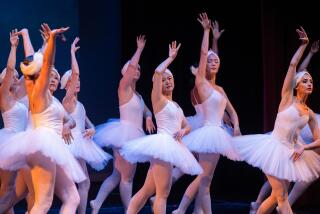Ballerina’s Steps Have Finally Led Her Home, But Only For a Visit
SAN DIEGO — “I’ve broken almost every rule in the book,” San Diego-born dancer Deborah Hadley said recently as she prepared to return home for a guest appearance with Stage Seven Dance Theatre this week.
“I wasn’t trained at a large ballet school,” Hadley said. “I didn’t train with the intention of becoming a professional dancer. I stopped dancing at a critical time. I have two children and I’m a single parent. That makes me very unique.”
But there are exceptions to every rule--and Hadley is definitely one of them.
“I was lucky,” she said. “I started training with Richard Carter and Nancy Johnson (founders of the now-defunct San Diego Ballet) and they were marvelous. Dancing was always fun for me.
“But I led a very sheltered life in San Diego, and when I got to New York, I became so disillusioned with the dog-eat-dog competition, I left to get married. I didn’t return to ballet until my marriage was over and I had two children to support.”
Hadley gave her last performance in San Diego in 1972 and has no ties to Stage Seven, aside from a couple of teaching stints at the company’s summer symposiums. But as Wayne Davis, guiding force behind the dance group, pointed out, she still has a link to the local scene.
“Deborah and I are old and dear friends,” Davis said. “I’m sort of a surrogate father to her. When I came back to the San Diego Ballet in 1967, she was a principal dancer, and later she danced some of my work at USIU. And she always said, ‘I’ll be thrilled to death to dance for you any time my schedule allows.’ ”
At last, the timing is right for Hadley--a principal dancer with Seattle’s Pacific Northwest Ballet since 1979--to come home. She will dance two pas de deux for each of Stage Seven’s three performances at San Diego City College Theater on Thursday, Friday and Saturday.
“She’ll be dancing ‘Lento a Tempo e Appasionato’ at all three performances,” said Davis, “and then she’ll be doing a different piece along with that at each performance.
“Thursday it’s ‘Tarantella’ and Friday it’s ‘Tchaikovsky Pas de Deux,’ both choreographed by (George) Balanchine, and on Saturday she’s dancing ‘Pas de Deux Campagnolo,’ a piece by Kent Stowell, her director at the Pacific Northwest Ballet.”
Benjamin Houk, Hadley’s partner at Pacific Northwest Ballet, will join her for the program--which means Hadley will never actually share the stage with Stage Seven’s company dancers this week. But her presence among them is what really counts, Davis said.
“It’s a big boost to them--a wonderful inspiration,” he said. “They don’t really get to see a lot of great dancers, because ticket prices for companies like the ABT (American Ballet Theater) are just too expensive for our dancers. And they certainly never get to see them up close.”
Ballet Mistress Kathryn Irey added that “it’s a beautiful personal experience for the kids to be around professionals. Doing class together with them is a real education.”
For his part, Davis is determined to make this week’s concerts a fitting showcase for the visiting artists. He has created three new pieces for the program and aims to coax the best performance possible from the mixed bag of talent that constitutes Stage Seven Dance Theatre. The latter is always a challenge.
“I try very hard to choreograph to their levels of progress,” Davis said. “It’s a talent born of necessity. We push the kids hard, and go right out on a limb. Sometimes they’ll come through with flying colors. Unfortunately, we don’t have a real stable population. (Once the dancers hone their skills), they just have to pick up and leave San Diego to make a living.”
Hadley, 36, typifies that phenomenon. Although she would like nothing better than to dance professionally in San Diego, she says, the economics do not allow for it.
“I wish I could stay here,” she said, “but that just won’t happen until there’s a company in San Diego that can support a dancer who has to make a living at dance.”
At least one Stage Seven veteran, Kim Clark-Chidley, did decide to make a go of it on the local scene, performing with various other area dance troupes during quiet periods at Stage Seven.
Clark-Chidley will be featured alongside Irey, another longtime dancer with Stage Seven, in “Waltz,” a dance Davis “sketched out” last summer and rechoreographed for this concert.
“It’s a pretty one--very classic--and all glittery in white and silver,” Davis said.
The second new dance, “Bolero,” a sensuous ensemble dance for the 18 members of Stage Seven, is “my favorite of anything I’ve ever done,” he said. “I’ve been wanting to choreograph to the Ravel music since the first time I heard it.”
In the third piece, “Heroes,” Davis has set up a movement world that probes the psychology of national idols. It’s one of the choreographer’s most cynical dances, and, as he acknowledged, “it’s a real departure for me.”
“Sometimes public figures are elevated to heroic stature, and then people begin to pick them apart,” Davis said in describing the theme of the dance. “John F. Kennedy was the savior of the world, and then he was (condemned) as a womanizer . . . It seems we create heroes because we need them--and we feed off them--and then we can’t stand the comparison with ourselves.”
Instead of setting “Heroes” in a contemporary cultural context, Davis made it a tribal work in a primitive society. The dance is performed to an original score by Jaime Malagon.
More to Read
The biggest entertainment stories
Get our big stories about Hollywood, film, television, music, arts, culture and more right in your inbox as soon as they publish.
You may occasionally receive promotional content from the Los Angeles Times.










